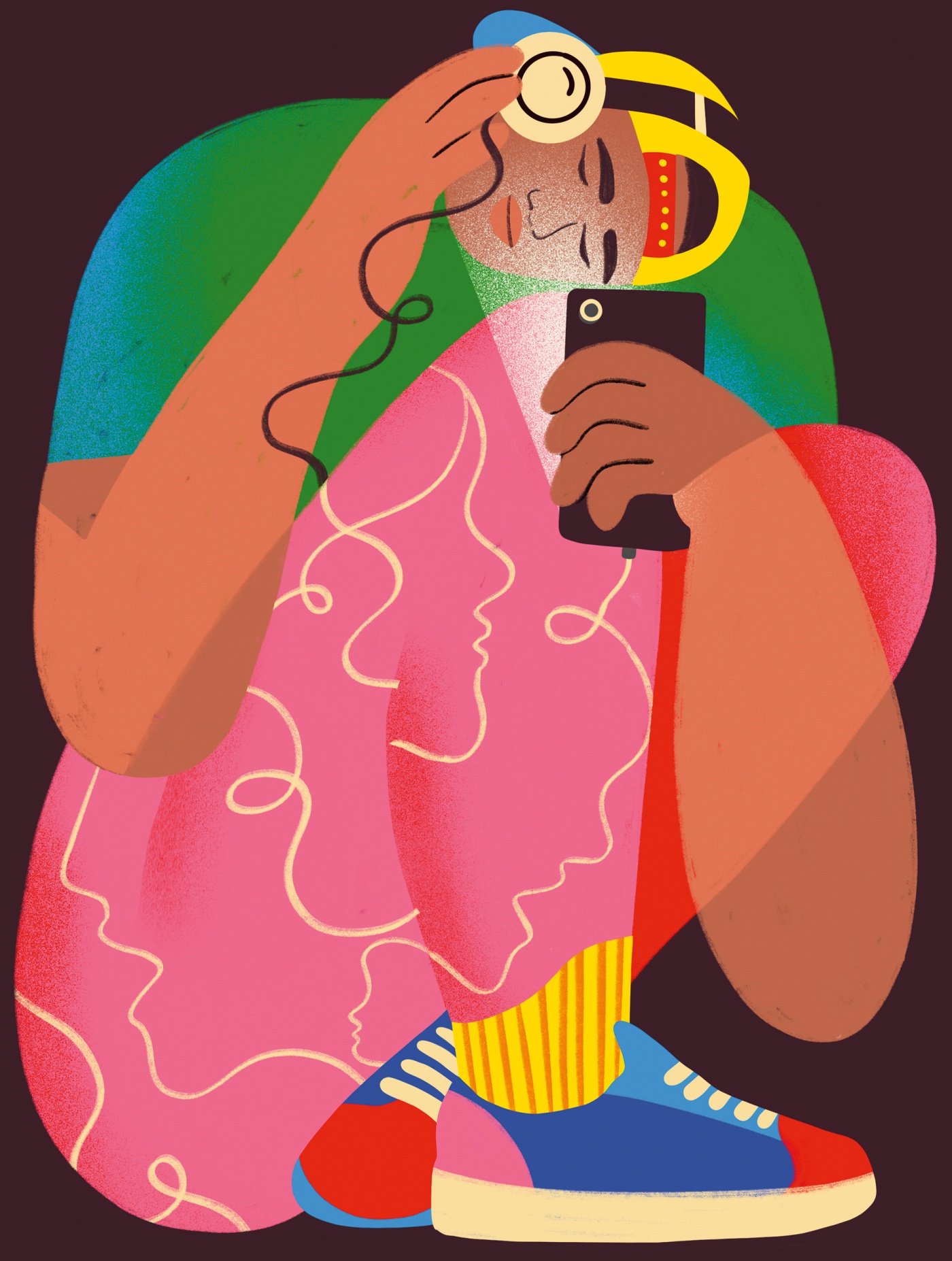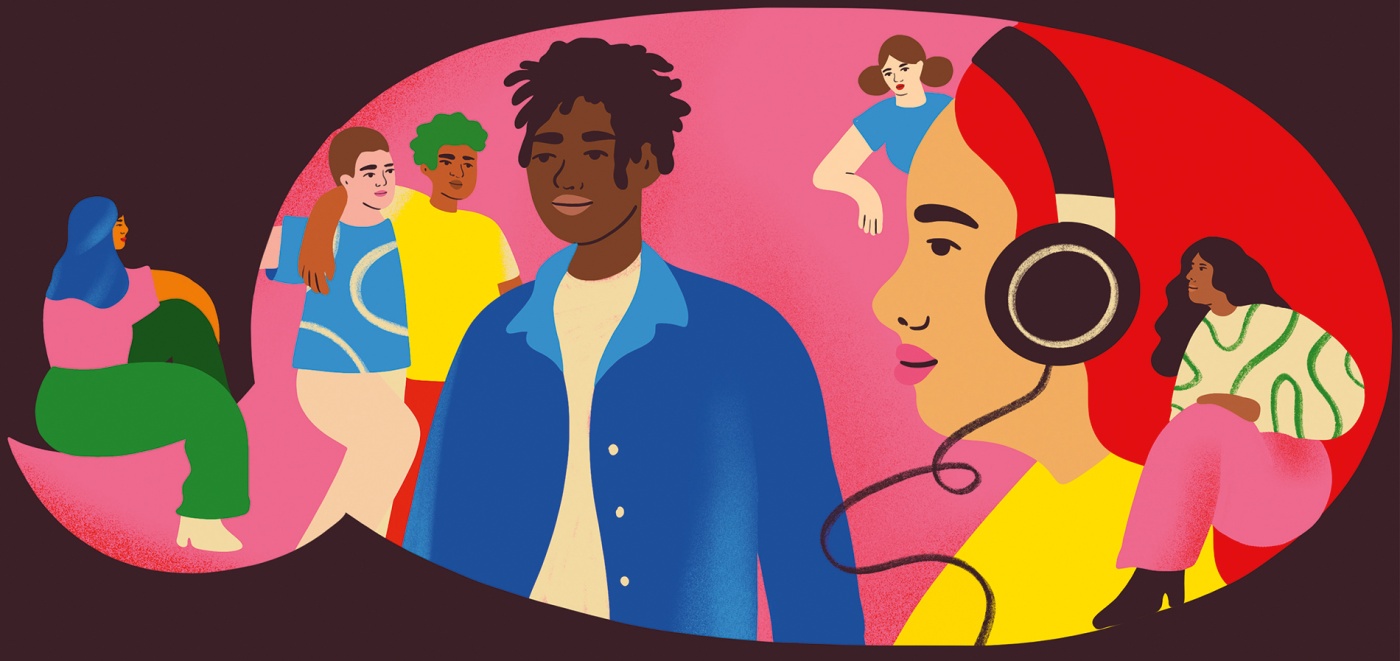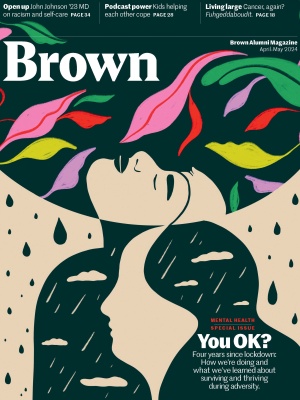Are the Kids Alright?
The pandemic hit teens hard, causing a measurable decline in mental health. Enter Molly Josephs ’09, whose podcast, This Teenage Life, became a lifeline for tweens and teens from California to Kabul, helping them to vent—and heal—one episode at a time.

In June of 2022, thousands of teens all over the world tuned into a podcast called This Teenage Life and listened as a group of young people brutally laid bare the post-traumatic toll the Covid-19 pandemic had taken on their mental health. Lydia Bach, then a 13-year-old from New York, lamented not just the lost schooling, abandoned sleepovers, and canceled family get-togethers, but the lack of space provided by adults to help them process “all of our grief and pain.” An 18-year-old Californian named Jade Bentley described how earning her driver’s license four months pre-pandemic meant watching what was supposed to be her “ticket to independence” slip away. College freshman Aaron Price recounted the isolation of campus lockdown, only permitted to leave his room “to get food and go on walks alone.” And Cloe Moreno, then 20, said that looking back on the peak pandemic years, including a canceled high school graduation ceremony and not being allowed to say goodbye to her grandfather when he died from cancer, she felt like the proverbial frog in boiling water “who hasn’t really noticed the heat being increased.”
Titled “How the Pandemic Has Changed Us,” the podcast aired on Spotify and Apple Podcasts and was produced, start to finish, by teenagers, including the narration, interviews, recording, music, sound effects, and accompanying web art.
But before all that young talent hits the airwaves, there’s another voice. It says, “Hey, this is Molly Josephs, the adult who works on This Teenage Life.”
Molly Josephs ’09 created the This Teenage Life (TTL) podcast in 2018 during a yearlong teaching gig at High Tech High, a project-based public charter school in San Diego where she was working after studying biology at Brown and school leadership at Harvard’s Graduate School of Education. After interviewing several High Tech High students for a short film series she was making about youth-inspired passion projects (documentary-making, electronic beat production, paragliding on a homemade aircraft), she recognized a need for more spaces where teens not only felt heard, seen, and understood but could “process their big feelings.” Those big feelings, Josephs says, included anxiety about racism, misogyny, sexuality, popularity, and relationships with family, friends, and teachers; climate grief; election stress; social media FOMO; and a general “feeling that the world is falling apart,” all of which she gleaned simply by listening to high schoolers as they spoke.
At the time, Josephs was new to podcasts (her favorite: This American Life) and “really into the notion that anyone could learn anything, just by listening.” With its emphasis on storytelling and forming connections with listeners, a podcast created by teens, for teens, seemed like a natural outlet for young adults to express themselves.
Joining forces with seven teenagers, she formed a twice-weekly after-school club. Gathering around a $25 microphone and a smattering of cell phones, they would record whatever was on their minds, including queerness and sexuality, rumblings of self-doubt, cancel culture, and the mind-blowing moment they realized their parents were people, too.
“I’m an educator, but I like to think of high school and college students as producers of knowledge rather than consumers of information,” Josephs says. “They have the most interesting ideas, so much zest and life force. When you give them the materials they need and get out of their way, they can run with it in a way that adults, unfortunately, have lost because of how the world kind of erodes us.”
“They have the most interesting ideas, so much zest & life force.”
When the pandemic struck, anxiety reached an all-time high, with tweens and young adults hit particularly hard. Between January and June 2021, 57 percent of female high school students reported experiencing persistent feelings of sadness or hopelessness; 26 percent seriously considered attempting suicide. A BMC Psychology study led by Brown researchers concluded that being forced to leave school mid-semester when the world closed down “triggered a decline in mental health” that resulted in most U.S. college students experiencing anxiety, depression, or feelings of loneliness.
And a recent National Institute of Mental Health-sponsored study found that the stress of shutdowns caused accelerated aging of teenagers’ brains; during 10 months of pandemic life, the average teen brain aged the equivalent of three years—on par with the premature aging seen in young adults who experience violence or neglect.
At that point, Josephs was back on the East Coast and TTL went remote, meeting over Zoom. Podcast production continued, including pandemic-inspired episodes on managing burnout, dealing with feeling disconnected from friends, and how quarantine had altered teens’ morning routines.
Then something they hadn’t anticipated happened: listeners started writing in.
“Hi, I just listened to your episode about A Year in Quarantine...I thought no one else knew how I was feeling. I’m not at risk or old or whatever, but I still felt and still do feel so alone. I wanted to thank you for making me feel validated in my feelings. Your podcast is so important to me and others.”
More letters poured in—from across the U.S. and Canada and from as far as Norway, India, Tunisia, Malaysia, and Qatar. Gamu, 15, from England, said the episode on pandemic life helped her feel connected in a way she hadn’t since her father passed away from Covid. Lola, from Ohio, identified with the “Feelings of Power” episode that explored “times when [TTL members] felt like badasses, and others when they felt just the opposite.” A male listener asked if TTL could dedicate an episode to dealing with the guilt someone might feel when leaving their family’s religion.
Josephs was struck with an idea: “They were feeling alone,” she says, “and we were already on video chat, so why not invite them to join?”

Soon, TTL’s weekly meetings resembled the opening credits of The Brady Bunch, but instead of the signature three-by-three grid, it was a dozen or more tweens and teens smiling from as nearby as Wisconsin and as far as West Asia. (Saturday mornings Eastern Standard Time worked well when factoring in the massive time zone differences.) A typical group dialogue session might kick off with a Nigerian 16-year-old sharing that she had recently changed schools and felt lost and alone without her usual circle of friends. A 14-year-old in Bangalore would chime in, “Me, too!” and then an 8th grader from Ohio would bring up the thorny issue of toxic frenemies. Cut to several months later, and a 20-minute TTL podcast titled “Friend Problems” hits the air.
Josephs calls the meetings “modern-day bonfires” that spark friendships, normalize stressful emotions, and build agency.
“When they share their voice and see the power they have to make something meaningful that can affect other people,” she says, “they realize they are powerful. It changes their sense of self-efficacy and their affect, and that spreads into other dimensions.”
Lydia, who’d emailed TTL to thank them for the quarantine episode, joined the group and created and hosted an episode to help listeners navigate their parents’ divorce. Gamu assisted with episodes about social anxiety and loneliness. A through-line of resilience runs through all TTL episodes. “We don’t try to dilute people’s experiences by saying, ‘You should be happy,’” Josephs says. “Instead, it’s, ‘How can you get through this?’”
To date, more than 110 episodes have aired, ranging in nature from lighthearted (“Taylor Swift”; “Barbies, Toys, & Childhood Nostalgia”) to sobering (episodes on eating disorders and suicide include trigger warnings). Mental health-related shows also clearly state that TTL is not a substitute for professional help and that listeners should reach out to a trusted adult if struggling. Nearly 500,000 listeners in more than 180 countries have tuned in, generating 1.3 million downloads. Olivia Ho, an original TTL host from High Tech High, wrote an op-ed for TeenVogue.com sharing how podcasting eased her lockdown isolation. (Watching Jeopardy! with her parents every night, which she sarcastically described as “every 18-year-old’s dream,” helped, too.)
“It’s powerful to have the opportunity to intentionally rewrite your perspective of and relationship to an experience you’ve had,” Josephs says. “When young people make things they care about, it can totally change the way they feel about themselves.”
That evolution can be heard loud and clear towards the end of the “How the Pandemic Has Changed Us” podcast, when Cloe Moreno says, “I think every kid and adult is coming out of this pandemic more adaptable, which I think is a huge positive… life will never stop offering hurdles and obstacles, but it’s good to know that we’re strong enough to handle them.”
“It’s the exact type of thing I wish I could have listened to when I was 13,” says Evelyn McKenney ’24, a senior International and Public Affairs major who was matched with Josephs and TTL through an iProv fellowship with the Swearer Center and serves as a group facilitator and producer. McKenney, who first discovered podcasts during her daily pandemic walks, says outlets like TTL and Now Here This, Brown’s experimental audio storytelling collective (she’s an editor there), serve as bright spots amidst a glut of “ugly places on the internet” that threaten the mental health of young adults.
“If you create a kind environment on the internet, teens will flock to it,” she says. “People are willing to share intimate details and connect across differences.”
When she’s not working on TTL, Josephs teaches computer science at the Dalton School in NYC and volunteers with Seeds of Peace, an Afghanistan-based leadership development organization that inspires new generations of global leaders in communities divided by conflict. (TTL partnered with Seeds of Peace to create several podcasts.) She has led professional development experiences at conferences like the National Council of Teachers of English Annual Convention, usually alongside a TTL teen, and creates activity guides and journaling prompts to accompany episodes on thisteenagelife.org for teachers and teens to use.
The science and animal conservation buff—who TA’d for several biology classes while at Brown, worked with dolphins and seals at a wildlife rehabilitation center and a cognition lab, and once wrote a Scientific American story about how to extract DNA from a banana at home—hopes to eventually develop a biology-centric TTL subseries to tackle teen health questions. She cites the late associate Dean of Biology Marjorie Thompson, who excelled in both science and art (including biological illustration and biologically inspired jewelry) as a significant professional influence.
Josephs is one of 12 innovators recently accepted into the Headstream Accelerator Program, a five-month hybrid accelerator dedicated to building technologies that empower the next generation to thrive. In 2022, TTL was in the top one percent of most globally shared podcasts on Spotify.
But what Josephs is most proud of is providing a safe space where teens and tweens can come together casually while connecting in a deep, authentic way.
As listener-turned-podcaster Aanya from Delhi put it in a letter to TTL, “I can’t believe how similar the problems faced by teenagers are. I mean, I live on the other side of the world and I feel you guys so hard!”
“The young people who listen to the podcast have a very powerful parasocial experience that I didn’t anticipate,” Josephs says. “They feel seen and heard and realize they’re not the only ones grappling with these feelings. It’s a beautiful cycle.”
Leslie Goldman is a health writer and author based in Chicago. She holds a master’s in public health from University of Illinois–Chicago.




